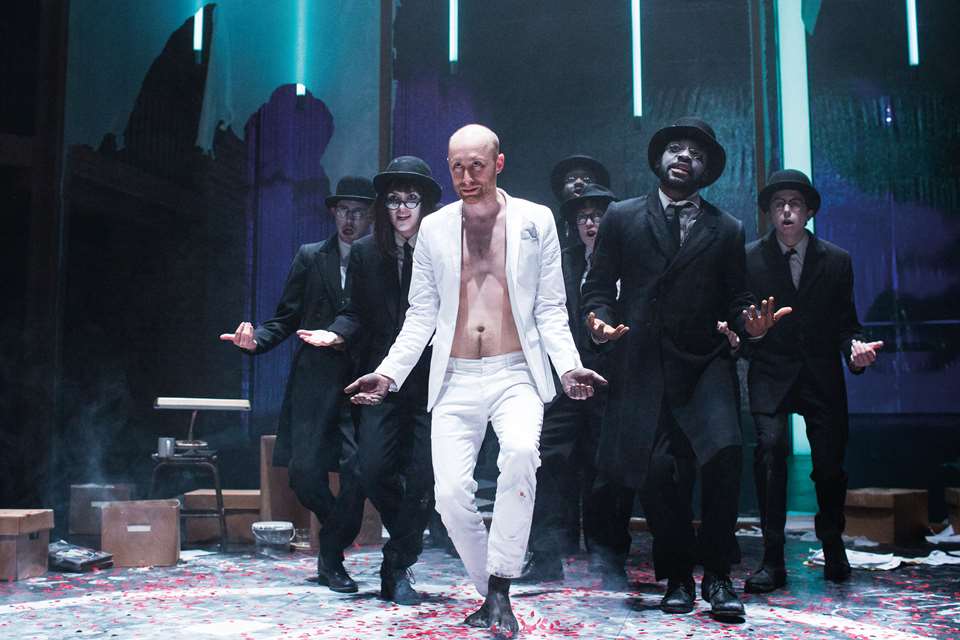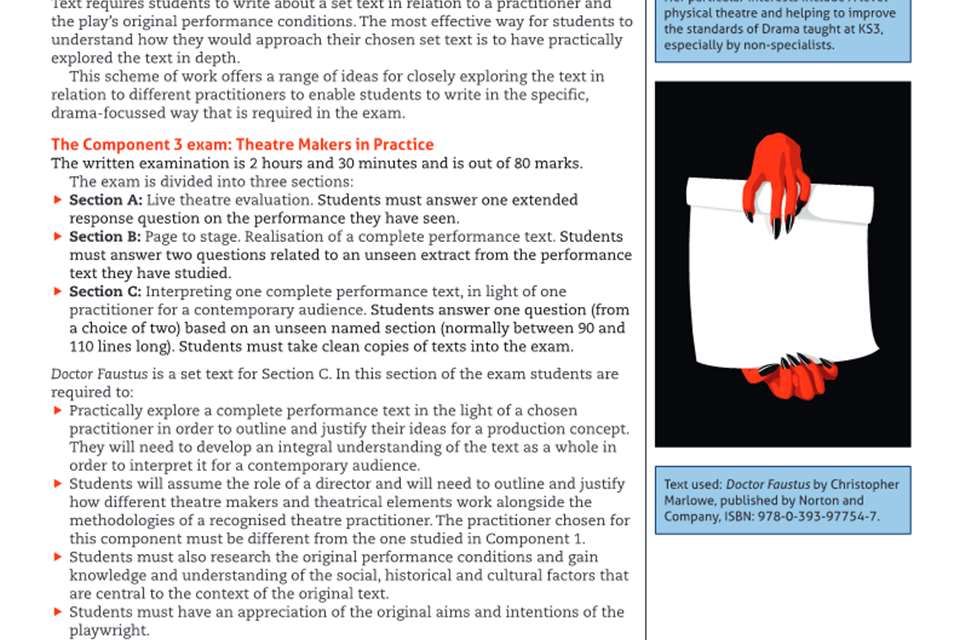Doctor Faustus by Christopher Marlowe
Philip Breen
Thursday, September 1, 2022
Each issue of D&T we bring you a page-to-stage focus on a play for performing with your students. Here Philip Breen unpacks Marlowe's Doctor Faustus

Helen Maybanks
Doing great plays has taught me most of the important things that I know. I know Galileo through Brecht, Richard III through Shakespeare and Jesus Christ (the superstar) through Andrew Lloyd Webber and Tim Rice. It's not just big ideas. Doing these great plays teaches you lots of little lessons too. ‘Always read the small print’, being one. Of course, with Doctor Faustus that has a very direct relevance in relation to his contractual agreement with the eternal Prince of Darkness. But more broadly, in reading and re-reading this play, I was once more struck by the importance of reading what is on the page, rather than what you think the play is, as so many directors come a cropper by directing the play's reputation.
A comedy and a tragedy
The ‘Faust’ myth is everywhere. There's even an episode of The Simpsons called ‘Bart Sells His Soul’. Man sells soul to devil in exchange for thing he thinks he wants (power, sex, money – five bucks in Bart's case). The story is the same: man gets thing, thing disappoints man, devil returns to take the man to hell, man wonders whether it was all worth it. The dumb mortal man is duped by the wily devil, who knows he will get his soul in the end. But in Marlowe's Doctor Faustus, there is something much more at play.
The big breakthrough came when I realised that the story was as well-known to Marlowe's audience in 1592 as it is to our audience now. It was a famous German folk tale. So much of the enjoyment of the play, like in ‘Bart Sells His Soul…’ comes in not what happens, exactly, but in how the story is told. It's in how Marlowe plays with the audience's expectations, to tinker with the story and the conventions of the theatrical medium to use an old story to say something unexpectedly profound about the current moment. The effect is strange and… actually very funny.
That was the next big breakthrough: it's funny, and not just in the funny bits. And the funny bits are also profoundly sad. The reputation of the play is of it being a tragedy, which it is in strictly classical terms, but the mood is so often being one of angst, seriousness and dark rooms lit by candlelight. But there are a lot of laughs and a lot of play.
Plot
Faustus has learned how to do magic. He draws the pentangles, lights the candles, spells God's name backwards and says all the Latin – ‘ipse nunc surgat nobis dictat’, just like Harry Potter. When Mephistopheles arrives, Faustus asks him: ‘did the devil send you?’, Mephistopheles replies ‘No I came here of my own accord’. ‘Did not my conjuring raise thee?…’, to which Mephistopheles says ‘That was the cause, but yet per accidens ’. Or to put it another way, ‘sort of, mate. But the pentangles and the Latin spells weren't really necessary’. They're just performance. Your candles and your smoke are just a spooky stage set. Mephistopheles then goes on to explain, ‘because you have turned your back on God or ‘what is good’, that's why I'm here’ – it's not because of ‘magic’, you dope.’ ‘Because you have committed to turning away from what you know is good, you can ipso facto, see devils.’
A commentary on human nature
Faustus creates hell for himself out of his own mind, in the act of pursuing what he thinks he wants. For Marlowe, in a world without God, it's all in our own hands. In what we desire, in how we act, in what we do. And the troubling mystery of why, when we know what ‘good’ is, we choose to turn our back on it and create hell.
It made me think of a conversation a child might have with our generation in forty years’ time, where they might say: ‘It must have been awful in the early part of the twenty first century. You can't have known about the conflict diamonds in your iPhone, or the damage planes did to the environment, you can't have known that a lot of your clothes were made by child slaves in Bangladesh…’, and we will respond that we knew about all of those things. This is hell, and we are not out of it.
The stripped back text
Magic is only the setting; Doctor Faustus is about much more, and it is good not to confuse the two. It is tempting as a director to be seduced by engaging in stage spectacle, using costumes and smoke, to make the audience believe in the devils. I might have done so myself had I not been forced by The Marlowe Sessions to stage the play with nothing but the text and the actors’ voices. That experience taught me something important. As Marlowe understood, the best place to stage hell is in the imagination of the audience. They already have a fair idea of what it looks like anyway.






